The One Necessary Success Habit Anyone Can Learn: And How To Develop It!
THE ONE NECESSARY SUCCESS HABIT ANYONE CAN LEARN: AND HOW TO DEVELOP IT! (ISSUE 86)
By Diane Gold
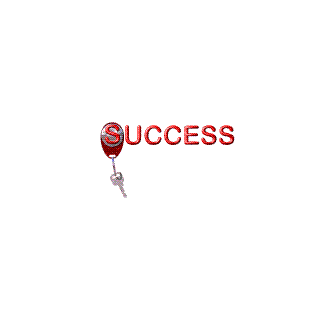 It would seem that it’d be hard to pinpoint one success habit that we need to succeed. But, it’s right in front of us and we all use it or lose it. The great thing is that everyone, more or less, can learn it. With respect to the developmentally delayed and emotionally fraught people I have and have not worked with and respect, it’s as easy as putting one foot in front of the other.
It would seem that it’d be hard to pinpoint one success habit that we need to succeed. But, it’s right in front of us and we all use it or lose it. The great thing is that everyone, more or less, can learn it. With respect to the developmentally delayed and emotionally fraught people I have and have not worked with and respect, it’s as easy as putting one foot in front of the other.
Let’s review the habit process, first. It is a behavior we have repeated over and over again after a cue which takes away pain or gives pleasure. We know that something TRIGGERs us to TAKE AN ACTION after which we get some type of result, commonly called a REWARD. This result or reward can be the joy of selling someone a product or an idea, which makes us feel powerful even though we often bill our mission as helping others.
OR it can be the joy we feel from the chemical change caused by taking some drug, alcohol or tobacco-like product, which we bill as fun but is usually to hide our lack of self-esteem. Or it can be the relief (joy) of preventing our bodies from going into withdrawal from lack of some drug to which we have developed a chemical dependence. It can even be as simple as the joy and focus we feel from taking a shower and feeling clean. In the latter example, we get up and feel dirty. This feeling triggers us to take a shower which leads us to feel that newness we feel after our skin is clean.
Okay, the one necessary success habit is not taking a shower, although most successful people respect themselves and others which would include bathing on a regular basis.
THE HABIT
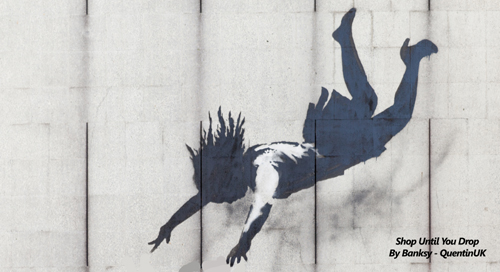
THE HABIT is to take one step after we fall, collapse, fail a test, fumble a deal, lose our status, get insulted, get demoted, fail a test, get fired, separate from a significant other, get embarrassed or get knocked down. Commit to this one step. When we go to take it, it might be the most unsure move we have ever taken, or so it feels at the time. It is crucial.
THE ACTION STEP
Here’s the easiest way to take that step which has a time limit on it.
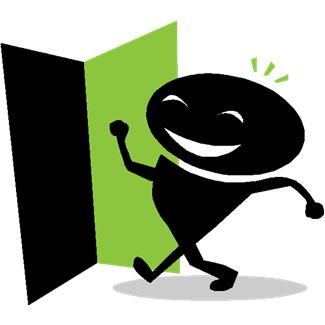 For just about anything, go out in the world for a walk and a talk. You may not have a smile on your face when you leave, but your perspective will be different when you return. That is the way we are built. Any little distraction, like a walk or a few words with another person, changes where we were headed the moment before – if we let it. (When we are focused on positive goals, we often choose to ignore these distractions. However, after a fall, distractions heal us.)
For just about anything, go out in the world for a walk and a talk. You may not have a smile on your face when you leave, but your perspective will be different when you return. That is the way we are built. Any little distraction, like a walk or a few words with another person, changes where we were headed the moment before – if we let it. (When we are focused on positive goals, we often choose to ignore these distractions. However, after a fall, distractions heal us.)
If you were fired from a job, send out one cover letter and resume within 24 hours. Not that you are interested in job hunting now, but the action step will insure that you cement the habit to get up after falling. Remember, we are creating THE ONE NECESSARY HABIT that will lead to success.
If your relationship broke up, talk to someone within 24 hours, even if it’s the server at the local coffee shop. Talk about anything, but connect with a human being. If possible, be with a group of happy people and talk about incidental things, dance, shoot golf balls.
If you fell off the wagon – any wagon – meaning you used drugs, drank alcohol or gorged yourself after a period of abstinence; celebrate that you are starting your first day toward your goal by telling a member of your support system within 24 hours. If you don’t have a support system, go to a library and talk to a librarian or go to the corner store and say hello to the owner. Talk about anything, but connect with a human being, outside, in the flesh.
If you gambled your rent away or just lost your retirement fund in a financial crash; go talk to the poorest person you know or have seen and talk about what is important in life. You might see life from a different angle after the talk. And it might help with your fall.
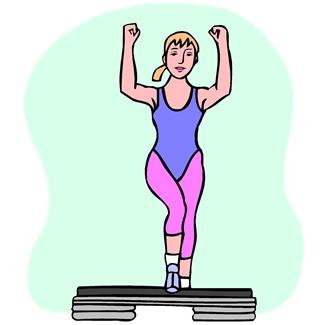
Obviously, the idea is to make a move. Whether it’s walking, talking, dance, seeking out a poor person, sending a resume; the idea is to move forward to minimize the down time. When we tell another, we are opening up our negative dyke and allowing ourselves to let go of our disappointment and lead ourselves on a new path.
CAUTION
Do not wait to feel like taking a step. That’s the trick! You will not feel it right away. You will want to take time and beat yourself up. You can beat yourself up after you make a move, which means after you begin to form your new success habit. You can self-beat in 48 hours, if you still want to. But, within 24 hours, follow the action steps.
ADDITIONAL ACTION STEP ONE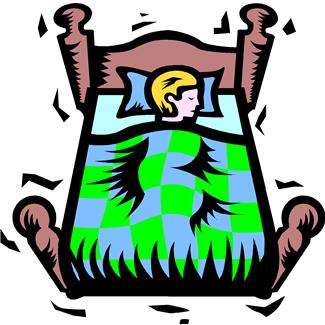
Make sure to lie down to rest early on the day of the fall. Sleep heals.
If you can’t get to sleep, play some kind of word game until you feel sleepy, knowing that sleep will heal you to some extent and that you will need your strength for your action step.
ADDITIONAL ACTION STEP TWO
 If we have experienced a chemical set back, meaning we have overeaten or done drugs or alcohol; our body will be in the fight or flight mode. Therefore, we will have to be aware that we will be getting cues to repeat the “fall” behavior. Every time we get our cue to do excess food or drugs or alcohol, we need to act according to plan.
If we have experienced a chemical set back, meaning we have overeaten or done drugs or alcohol; our body will be in the fight or flight mode. Therefore, we will have to be aware that we will be getting cues to repeat the “fall” behavior. Every time we get our cue to do excess food or drugs or alcohol, we need to act according to plan.
Here’s the plan: we will drink a glass or two of water every time we get an urge. This will diminish and probably remove the urge or cue temporarily. The cues will become fewer and fewer and more controllable in time. And we can go on about our business without the fall we have just experienced. Our new reward will be our pride in self, our relief at moving toward our goal and development of our new great habit.
CONCLUSION
 The important thing about learning the one necessary success habit is to follow through on a daily basis toward the goal we have set for ourselves. With substance abuse, when we get that urge, that cue to behave in a way that does not support our goals, we need to have a planned activity in mind so that we can take a positive action and get our reward. With losing face or money, the planned activity will be to take a step toward our goal within 24 hours AS IF we felt like it.
The important thing about learning the one necessary success habit is to follow through on a daily basis toward the goal we have set for ourselves. With substance abuse, when we get that urge, that cue to behave in a way that does not support our goals, we need to have a planned activity in mind so that we can take a positive action and get our reward. With losing face or money, the planned activity will be to take a step toward our goal within 24 hours AS IF we felt like it.
We each form our habits based on our personalities, our goals, how we were raised and how much repetition we have had at forming them. The more we plan and follow through with them, the more natural it will be to form a habit that helps us. And getting up after a fall is key. It puts us in position to have an internal resource for success, no matter what happens.
FEEDBACK
Please leave a comment and LIKE.
DIANE GOLD, AUTHOR
Diane Gold, Founder of Warriors of Weight, Turning Habits Into Health, is a mentor in tai chi, kung fu and meditation, a music, fitness and stress expert, dedicated mom, studying plant-based nutrition.
She loves talking about habits and tiny but crucial strategies to develop good ones out of the ones that no longer empower us or never did. She says,
“With a little focus, we can beat the habit game. We can learn how to manipulate our own habits and use them to our advantage rather than have them be detrimental to us. All we need is a little awareness, a little one-pointed attention and a little faith and we can re-learn how to develop a habit to our standards.”

 Since I am about to speak on animal experiments, let me say that I applaud any research that does not involve the use of animals (gorillas already have rights) , that any animal should have the right to live a leisurely life in a posh facility as a reward if s/he has donated her time to human science;
Since I am about to speak on animal experiments, let me say that I applaud any research that does not involve the use of animals (gorillas already have rights) , that any animal should have the right to live a leisurely life in a posh facility as a reward if s/he has donated her time to human science;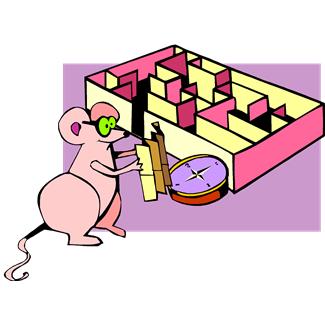 In Charles Duhigg’s book, cited above, he talks about experiments done by the National Institute on Alcohol Abuse and Alcoholism, where they studied habits using mice. They gave the mice a cue – which is the first of the three-part make-up of a habit – and, thus, created a habit. When the mice had learned to successfully respond to the cue, in this case, pull a lever, they were rewarded with food. This went on until it was quite routine for the cue, the action (the second part in the habit cycle) and the reward (the 3rd piece of the cycle).
In Charles Duhigg’s book, cited above, he talks about experiments done by the National Institute on Alcohol Abuse and Alcoholism, where they studied habits using mice. They gave the mice a cue – which is the first of the three-part make-up of a habit – and, thus, created a habit. When the mice had learned to successfully respond to the cue, in this case, pull a lever, they were rewarded with food. This went on until it was quite routine for the cue, the action (the second part in the habit cycle) and the reward (the 3rd piece of the cycle).
 For this action, he would get a reward of juice. After repeating this cycle – cue, acquired action (Duhigg calls this “routine”), reward – touching the lever to get his reward became an ingrained habit.
For this action, he would get a reward of juice. After repeating this cycle – cue, acquired action (Duhigg calls this “routine”), reward – touching the lever to get his reward became an ingrained habit.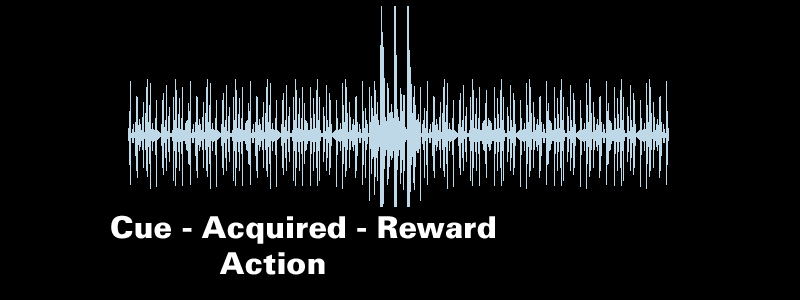 Schultz had had an electrode placed in Julio’s brain to read his neurological activity. It showed that Julio would get excited or happy when he got his reward. More activity at reward time in this simulation.
Schultz had had an electrode placed in Julio’s brain to read his neurological activity. It showed that Julio would get excited or happy when he got his reward. More activity at reward time in this simulation.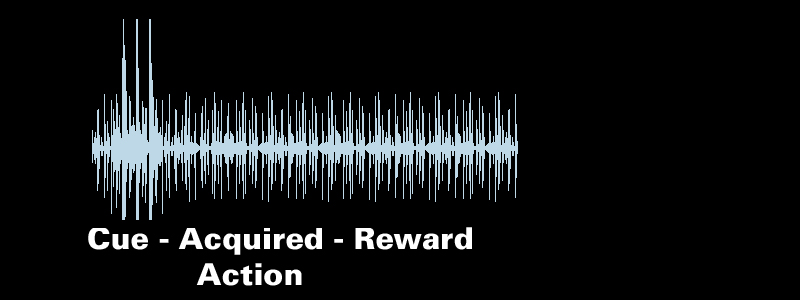 As Julio’s habit became stronger, from more time doing the same behavior, his neurological activity changed. The spike in activity came from anticipating his reward. So the cue became the trigger. The excitement that used to come from the reward was now coming when he saw the cue (in this case, it was visual). Ah, primates! How alike we all are.
As Julio’s habit became stronger, from more time doing the same behavior, his neurological activity changed. The spike in activity came from anticipating his reward. So the cue became the trigger. The excitement that used to come from the reward was now coming when he saw the cue (in this case, it was visual). Ah, primates! How alike we all are.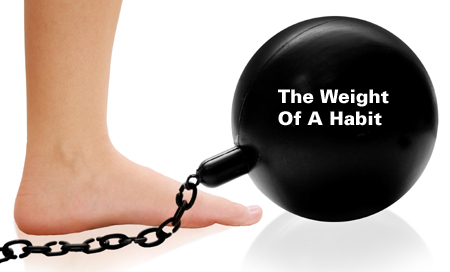 Let’s talk about Julio, the macaque, again. He had a strong habit. When the professor took away his reward or reduced the sugar content in his juice, he would become angry or depressed. He was hard to distract even when he was given the opportunity to go out of the experiment area and socialize with others because he was busy having an urge for what had been taken away. He continued to stay near his computer monitor which had given him the visual cue, continued to press the lever that had previously given him his reward, craving his reward.
Let’s talk about Julio, the macaque, again. He had a strong habit. When the professor took away his reward or reduced the sugar content in his juice, he would become angry or depressed. He was hard to distract even when he was given the opportunity to go out of the experiment area and socialize with others because he was busy having an urge for what had been taken away. He continued to stay near his computer monitor which had given him the visual cue, continued to press the lever that had previously given him his reward, craving his reward.





